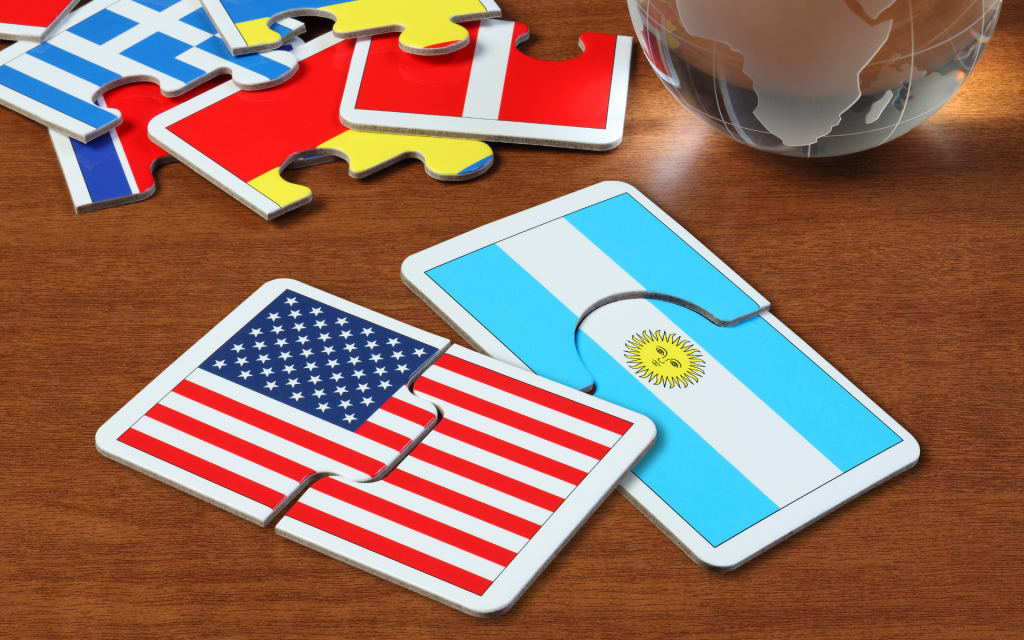Global Citizen or Hometown Misfit?
Foreign Identity

When I was nine years old my father was headhunted to save a suffering advertising agency in Buenos Aires, Argentina. I had just entered the fourth grade, yet within six weeks our entire house was packed in boxes and his company flew us, first-class, on the long journey to South America to begin our new lives.
My sister and I had begun learning Spanish at home, repeating the phrases spinning off of the record player. In the early days in Buenos Aires, we loved pretending we were already fluent, speaking in gibberish to each other as we walked independently ahead of our parents.
Promptly we entered an American community school that had English speaking teachers and Administration for the first half of every day, and at lunch would switch over to Spanish teachers and principal for the afternoon session conducted all in Spanish. There were kids from all over the world there, so internationally I fit right in.
Everything from siesta time in the afternoon when all the shops would close, to having dinner after 8 pm was new and exciting. Every day was an adventure. We had one idyllic year before the political situation changed dramatically with Juan Peron being elected and American’s being despised for their democratic election process, and some top American CEO’s even being kidnapped. I watched my parent’s stress levels rise.
We were fingerprinted everywhere we went. Each morning before school armed guards emptied our book bags onto the playground and frisked us against the wall as my father watched anxiously from the car until we were safely inside. Although I’m sure none of my American school friends were having this experience back home, as a child without too much to compare it to, I took it in my stride.
But opening the front door without looking through the peephole first, got me in huge trouble! In Argentina, with the dollar strong we were considered rich and had a live-in housekeeper and a chauffeur/handyman. My parents insisted we kept our rooms clean, not wanting to spoil us beyond repair knowing someday we’d return to New York.
We took the opportunity to travel all over South America during those two short years when finally we were sent home, earlier than planned as the situation was too dangerous there, especially for Americans. We were whisked out of school one day about a week before the term ended, told to pack our favourite things and left the next day. My father, however, remained in Buenos Aires to complete the final year of his contract.
We moved back into our house that my parents had rented out while we were away, and started back at school with all our old friends. But this was not simply stepping back into our old life! Most of my close friends had made new best friends while I had been away. I felt left out. In school, I was way behind in math having attempted to learn the metric system in South America and follow the protocol of their teachings. Watergate had also happened while we were dealing with our Argentine political nightmare.
America had progressed rapidly in its materialism and patriotism. My parents also chose that time to separate and I felt like the only kid in the universe without a Dad around. I was worldly, sophisticated, bi-lingual and insecure. My mother was quickly spiralling into her grief, my sister was dealing with finding her niche in high school and also creating new friendships. I felt very much alone and confused, not having all of the information I needed to make some kind of sense out of suddenly being home.
We were not up to date on the latest television programmes, music or fashion and culturally we just felt strange. Everything in the states felt new and spectacular to us having missed it so much while living in what was still considered a third world country at that time.
In Argentina we had to wear uniforms to school so back in the states I was thrilled to be able to express myself wearing whatever I pleased to school, unaware of how cruel kids could be if you were remotely different. Most of my classmates in Buenos Aires were from another culture and more accepting of others as a result. But in the states, there was some unspoken “cool” factor. The American peace, love and drugs era had erupted while we were away, another main reason my parents took the opportunity. Socially I missed all of that and was rather naive about marijuana, drinking or making out with boys. That made me distinctly not cool.
I was too immature to be sent to the high school to continue with Spanish lessons at my level, so I slept through Spanish classes in junior high school, excluding me even further from the other kids and made me lose two years of continuing to develop the precious foreign language I had worked so hard to learn.
All of us found culture shock in our own country to be much worse than culture shock abroad. It was unexpected I guess. We hadn’t realised how much a country continues to develop and change while we were busy paying attention to the country we were in.
Years later I married a British man and moved to the UK. I was surprised even though English speaking, how incredibly different the British culture as opposed to the American culture was. We went on to have children, with midwives attending very natural water-births, which freaked out my mainstream American parents. I chose to remain in the UK, despite struggling with accepting England as my own. I was in a constant push-pull fight within myself, never quite knowing where I belonged.
Each trip back to the states created a wider abyss in the culture shock department. I looked different wearing more elegant European fashions as America was becoming more and more casual. In the grocery stores, I felt stupid having no idea how to use the cashpoint at the check-out as they hadn’t made it to the UK yet. I asked a shopkeeper who was the artist singing a fabulous song and he shamed me for not knowing because he was famous and the latest star….how could I not know that? I sounded American, but I had lost my American identity.

When 911 happened I listened to the news in shock, simultaneous planes going down in Pennsylvania and the Pentagon blowing up in Arlington, Virginia. Frantically I dialled my father in New York, my mother in Arlington, my sister in Pennsylvania, feeling as far away from home as I possibly could be. Eventually, my father got through to me to let me know everyone was safe. But the political and patriotic rift that debilitating event caused within my own family was unbelievable.
America painted itself to be the victim, with dramatic black magazine covers, but that’s not how it was portrayed in the rest of Europe! Here magazines showed photos of a devastated Iraq with the headlines stating, “America, what did you expect?” Very different perspectives. I was devastated.
The towers were still being built when we returned from Argentina, and in my young adult years I had been wined and dined in 'The Windows On The World'. I had also helped a friend in display install Christmas decorations in their lobbies. Exactly one month before 911 I was standing under them with my young children on a very hot August day and asked them if they'd like to go to the top. They were exhausted from all of our tourist activities that day and declined. I remember my words as though carved in stone, "we can see them another time, they're not going anywhere."
I am not remotely interested in politics, but I heard many opinions against the American government on this side of the pond. I remembered travelling in New Zealand in my 20’s and people being dismissive of me because of my American passport. I asked why and it was something President Reagan was doing, or not doing at the time, that affected their farming. I realised that all of that patriotic brainwashing I had grown up with, was just that and the rest of the world did not necessarily agree with the American narcissism or see me as anything other than an extension of what the government was doing. No, I did not fit in, whilst flashing my American passport.

Little by little I observed America losing its freedoms, stealthily, and noticed my friends among many trying to “keep up with the Jones’”. Even the verbiage changed, there were new words and sayings, and a thousand new “rules” about what was considered “politically correct”. I wondered, while hiking in the green, rolling, British Dales across open land, what has happened to The Land of the Free?
About 5 years ago I went back to New York with a fantasy of moving there and pretty quickly got that thought shouted out of my mind from angry, wired and stressed New Yorkers just being themselves. Were they always that way? Usually, I go “home” to visit and find myself beaming with joy at my childhood memories and spending hours in grocery stores tripping down memory lane and discovering with delight all the new choices available. And then someone hears me speak in my British laced American accent and asks, “Where are you from?”
On top of all that I chose a less than mainstream profession, Incan Shamanism and energy healing, I’m getting used to the strange looks and rolling eyes. I teach people how to identify and release subconscious limiting beliefs and keep their energy in balance. I take small groups on spiritual healing trips to Peru annually to help people open to new philosophies and traditions so we can all move towards becoming One World, remembering love, ending racism, having conversations instead of wars, helping the less fortunate, and taking care of our beautiful Mother Earth.
Having lived in 5 countries so far, I have learned what it is to be consistently the foreigner. The easiest way to adapt is simply to accept that I choose to travel and live abroad and that the rest of the world does not stop while I continue to explore! I embrace cultural differences and have learned to laugh heartily at myself and to always expect the unexpected. I always eat local food, respect the dress code if there is one, rearrange my schedule to conform to the timings of whichever new land. My culture does not make me a prisoner of its government. If others have a problem or a judgement about my heritage, I know it has nothing to do with me. I have learned that where I unpack my bag, becomes my home.
About the Creator
Shannon O'Flaherty
Poetic free spirit, mother of two gorgeous men, practicing shaman, healer, therapist, educator and author. I take small groups on spiritual healing trips to Peru. World traveler, fascinated by human dynamics and relationships.






Comments
There are no comments for this story
Be the first to respond and start the conversation.